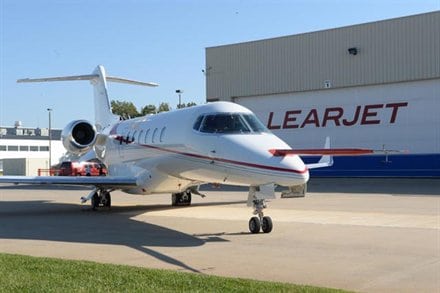 |
| The Learjet 85. Photo: Bombardier |
[Avionics Today 01-28-2015] Rockwell Collins CEO Kelly Ortberg sees a possible positive outcome in Bombardier’s Learjet 85 program “pause” announced earlier this month. The problem-plagued midsize business jet program was halted indefinitely, slashing an estimated 1,000 jobs at Bombardier’s Kansas and Mexico facilities in mid-January — leading many to believe the company’s resources are stretched too thin for the program to continue.
Companies such as Rockwell Collins, which have contractual agreements and possible gains aligned with the program, are also taking the hit as the manufacturer pumps the brakes. However, Ortberg believes that focusing Bombardier’s efforts on other current bizjet programs — the CSeries and the Global 7000 and 8000 jets — will allow for more possible gains in those areas.
“My feeling on this is that, if this allows Bombardier to be more successful in their schedule on CSeries and Global 7000/8000, it’s probably a good thing for us,” said Ortberg during the first quarter 2015 Rockwell Collins earning’s conference call late last week. Rockwell Collins had an estimated $30 million tied up in the deal to provide its Pro Line Fusion avionics for the flight deck of the Learjet 85, a contract the company signed in 2008.
 |
| Kelly Ortberg, CEO, Rockwell Collins. Photo: Rockwell Collins |
The CEO’s optimism stems from the company’s stakes in both the CSeries program, for which the CS100 is slated for entry into service late this year, and the Global 7000 and 8000 aircraft, expected in 2016 and 2017, respectively — much sooner than the Learjet’s uncertain entry date prior to the pause. Rockwell Collins provides the primary flight control computer aboard both aircraft, thus incentivizing the company to encourage progress in any direction.
While Learjet 85’s hiatus isn’t an all around loss for avionics systems integrators and suppliers, Ortberg admits the uncertain future of the program does present a problem as far as the company’s long term outlook is concerned.
“It comes as no surprise that the program was paused. We took the revenue out of our forecast for 2015,” said Ortberg to investors. “We do have the Lear 85 program baked into our long-term outlook, so it’ll be interesting to see, does the program come back on or do we go to termination?”
Pierre Beaudoin, president and CEO at Bombardier, insists that the market for the mid-sized business jet simply isn’t available at the moment and that the pause is temporary. Many in the industry don’t see the program returning, however. “We think this is a cancellation of the program, not a pause,” Rolland Vincent of aviation consulting agency Rolland Vincent Associates told Avionics Magazine in an earlier interview regarding the decision. Contrary to what Beaudoin says, Vincent believes the market is actually in good shape for this type of aircraft.
Ortberg seems to agree with Vincent’s assessment that the business market is moving toward an uplift, noting in the call that the company is seeing “early indicator signs of utilization rates that things are picking up” in the midsize and light business jet market. Still, without a definite decision, the company is left with loose ends in regards to the Learjet program.
“In terms of long-term impact to us, it kind of depends on what happens,” said Ortberg. “I’m sure if the program doesn’t come back online that the demand for the airplanes won’t go away, it’ll just go to different places and Bombardier will probably try to move them into one of their other aircraft like a Challenger 350. If they lose those customers they’re likely to go to either Cessna, Embraer or Gulfstream IAI. Depending on how that all works will determine whether there’s net impact to us in the long run.”
And with the program’s future still up in the air, whether Rockwell Collins will see a return on their $30 million investment or cash in on the company’s contractual guarantee still remains to be seen.
“What we’re working through right now with Bombardier is: What is the future of that program?” said Patrick Allen senior vice president and CFO at Rockwell Collins. “And I think it’s fair to say there is a lot of uncertainty around that right now.”